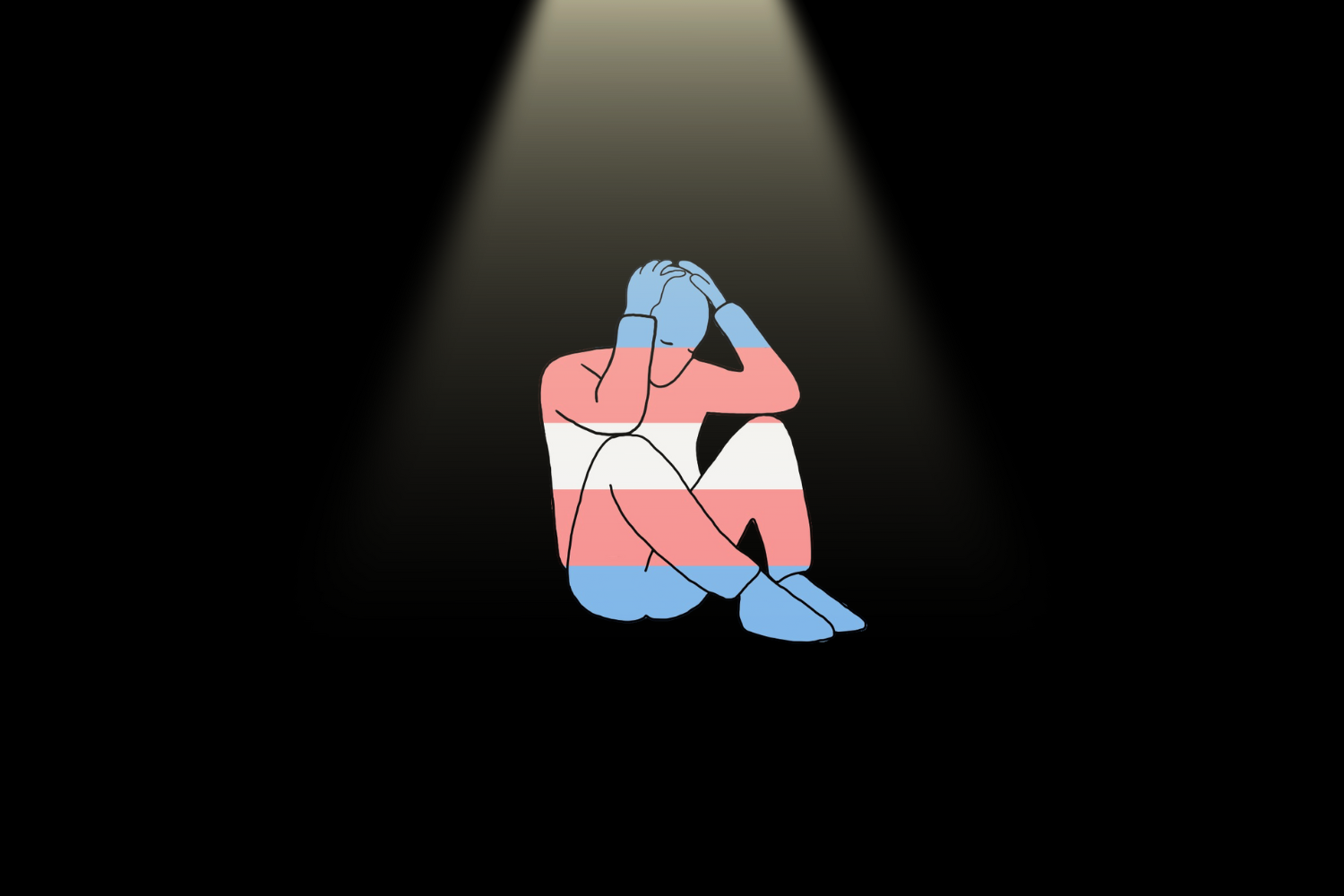Editor’s Note: The identity of the author is being kept anonymous to ensure the author’s personal and professional protection.
At the start of every day, I count my hours.
I am only able to wear my chest binder for eight hours per day, so I need to choose wisely. Should I put it on before I leave for my classes, so I can feel comfortable in front of my classmates? Or should I save it for later in the day, when I’m hanging out with friends? Perhaps I’ll divide my time into four-hour halves and compromise?
There are 24 hours in a day — and for only one-third of those hours, I am able to feel like myself. Any longer, and I risk serious injury, from rib bruising to fluid buildup in my lungs. Despite the risks, I need my chest binder to feel safe in my own skin, and I can’t imagine a day without it.
I realized that I didn’t fit into the gender binary when I was 14. I couldn’t quite place why puberty had upset me more than other people, but, in late middle school, I began to experiment with they/them pronouns among a close circle of friends,. When I was referred to with anything other than she/her pronouns, I could finally be seen as myself. However, the weight of what life would be like as a trans person terrified me. Even at this young age, I understood how difficult it was to receive gender-affirming care, and I grew up in a household where I was told that trans people lead difficult and miserable lives. Instead of embracing my identity, I decided to repress these feelings and tried not to think about gender at all for much of high school.
That all changed when I got to college. When I received my acceptance letter to Vanderbilt, a school located in progressive Nashville with a vibrant LGBTQ+ community, I couldn’t be more excited. Slowly, I began to come out as transmasculine to my group of friends and started using exclusively he/him pronouns. To my relief, after a few learning curves with names and pronouns, they all supported me. But despite my luck with my friends, the wider Vanderbilt community felt like a constant foreboding presence.
For the first time in my life, I felt like I could share who I truly was, but it seemed as though my Vanderbilt community turned its back on me. Tennessee as a state has a consistent track record of anti-LGBTQ+ legislation, but — perhaps naïvely — I convinced myself that I was safe at such an elite and progressive campus like Vanderbilt.
I couldn’t have been more wrong.
When Matt Walsh claimed that VUMC was harming minors in September 2022, Vanderbilt suddenly became a hot zone for anti-LGBTQ+ protests. It wasn’t uncommon to see protestors claiming that doctors were castrating children on my walk home from class. Without proper security to keep these protestors away from students, some even entered our campus wearing signs claiming that children should not be able to consent to taking puberty blockers. The protestors were chilling reminders that anyone could walk onto my campus at any time and spout their transphobic rhetoric for all to see. I began to have to make decisions about whether to wear the clothing that makes me feel most comfortable or safest in public. I knew that 46% of trans individuals had been harassed for their identities, and I didn’t want to become one of them.
Around this time, for the safety of staff and students, the K.C. Potter Center, where I was able to spend time with other LGBTQ+ students, temporarily shut down. All at once, it seemed like my community had been taken away from me. I started to get angry. Everyone seemed to be apologizing to me about this situation, but their words were rarely followed by action. I was glad to see a table at Rand supporting trans youth by making buttons, but I couldn’t help but notice that support for the trans community only came after a tragedy. VSG making posters in support of trans youth and students was a good start, but it wasn’t enough.
In the gap between then and now, dozens of anti-LGBTQ+ bills rolled through the Tennessee legislature. Weeks after two anti-trans bills passed, Chancellor Daniel Diermeier finally sent an email to students concerning the situation, but it did little else other than offer resources and suggest a task force that has yet to create actual change on this campus. Many students were silent until headlines started to break. I didn’t hear about any protests or other initiatives against these policies until the damage was already done.
At the start of the new year, the situation only seemed to worsen. Tennessee’s “slate of hate” began with numerous laws targeting trans people, and the dangerous bills that Republicans had proposed actually started to pass. Notably, Senate Bill 3 designates “male or female impersonation” as adult cabaret performances — effectively banning trans people and drag from public, and SB 1 eliminates minors’ ability to receive gender-affirming care.
For weeks, the weight of these bills caused my mental health to go into a tailspin. I was afraid of legislators, who seek to eradicate me. I was afraid of Vanderbilt administrators, who, other than a late and vague email from Diermier, remain eerily silent. I was afraid of my peers, and how those to whom I was out would start to see me. I was afraid of myself and started to believe, after hearing it from lawmakers over and over again, that I was something worth eradicating.
I came to Vanderbilt to study my passions and set me up for an exciting future. I didn’t come here to watch my community’s rights be stripped away before my eyes. Nor did I come here to listen to my fellow students, like those in the Vanderbilt College Republicans, debate whether or not the children of my community should have access to gender-affirming health care that could save their lives. To me, participating in or attending these kinds of debates is violence against the trans community, plain and simple.
The violence that took place on March 27 at The Covenant School was absolutely abhorrent and morally detestable in every way. Given that the shooter was a transgender man, I’ve become extra fearful that people will interpret this attack as reflective of the entire trans community, which could not be further from the truth. I expect the trans community to be the subject of much of the blame for this shooting, as Marjorie Taylor Greene has suggested on her Twitter. My only hope is that this tragedy creates greater gun control legislation rather than a renewed hatred for the trans community. Trans people are not the problem; guns are.
If you truly want to help the trans community, donate to organizations that fight to protect us, like Inclusion Tennessee and Nashville LaunchPad. Demand better responses from your administrators. Be the voice of change within your own communities and friends and call out transphobia when you see it. Be willing to learn and give space for trans students to voice their concerns, rather than assuming what trans people need.
Trans people deserve to feel safe in their classrooms, homes, workplaces and world. It’s easy to feel overwhelmed when that safety is threatened, but that doesn’t mean the fight is over. If Vanderbilt values its diverse student body, then it’s about time we start acting like it, because I’m not going anywhere.
Editor’s note: Shane Mumma, VCR president, responded to The Hustler’s request for comment regarding the allegations against VCR debate participants in this piece. His response can be found in full below.
“My fellow organizers of the debate and I are disappointed this individual [S] feels this way, but we don’t view the debate as violent in any way whatsoever. Regardless of where one stands on this issue, it is an issue that is already being vigorously debated across our state and country. So, shying away from discussing it on campus only silences Vanderbilt student voices, and does not make the law or the broader dialogue go away. Thus, our commitment to holding this debate as planned and standing up for free speech remains unwavering. We therefore support the Op-Ed writer’s right to speak out as well.
We encourage all Vanderbilt students to attend our debate. We similarly think our debaters on both sides have immense courage for standing up for their beliefs in front of a large audience of their peers, as it is empowering to be able to voice one’s views and have discussions with those on the other side. Encouraging students not to do so is setting them up to squander what should be an incredibly enriching college experience here at Vanderbilt University.”
Junior Ari Sasson, Student Body Vice President, responded to The Hustler’s request for comment regarding the statement directed at VSG in this piece. His response can be found in full below.
“VSG and I have begun conversations with the Chancellor’s Office about developing programs that assist students in taking legislative stances of their own, which could include stances against anti-LGBTQ+ policies. We also did a letter-writing event with Lambda to offer support to queer and transgender youth in TN.”



